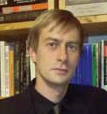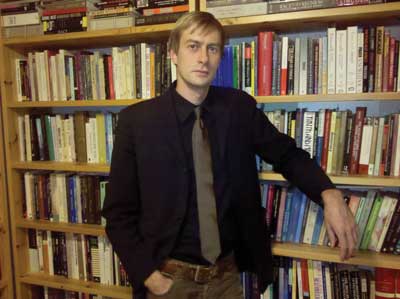 “We’re not searching for truth anymore,” says philosophy professor Colin Koopman. “What we want is meaning. We want to know why the truth we can find with our iPhone is meaningful.”
“We’re not searching for truth anymore,” says philosophy professor Colin Koopman. “What we want is meaning. We want to know why the truth we can find with our iPhone is meaningful.”
 Philosophers tend to be categorized as the most severe kinds of academics. Immersed in theoretical concepts like epistemology, deconstruction and historicism, there’s a sense that what they study can’t be translated to practical public discourse. But this is hardly the case with Colin Koopman, a new assistant professor in the Department of Philosophy.
Philosophers tend to be categorized as the most severe kinds of academics. Immersed in theoretical concepts like epistemology, deconstruction and historicism, there’s a sense that what they study can’t be translated to practical public discourse. But this is hardly the case with Colin Koopman, a new assistant professor in the Department of Philosophy.
Though Koopman has the classic demeanor of a philosopher (serious, refined, precisely articulate, intensely confident), his current interest requires no real-world translation. Koopman’s chief concern is the rapid restructuring of contemporary society by the Internet.
Like many other informed observers, Koopman sees the Internet as changing not only how we communicate with one another, but also how we frame concepts such as privacy, truth and the public sphere—even (especially) how we create and represent our identities.
His line of inquiry raises questions such as: What is the value of accumulating knowledge in a time when the World Wide Web provides encyclopedias of information at our fingertips? And, how are our ideas of privacy and private property evolving to accommodate a digital world overflowing with personal information?
The answers will have repercussions for how we teach at all grade levels, for property law (particularly intellectual property rights) and how we differentiate acceptable and unacceptable online behavior.
In Koopman’s view one of the core challenges to approaching such questions is that we lack the terminology even to describe what the Internet is. “We call it ‘the Internet,’ like it is one thing,” he said. “It may have a physical infrastructure, albeit a hyper complex one, but it is at bottom an activity, not a thing.”
The goal of a philosopher, said Koopman, is not to provide answers, but to orient society to troubling questions and assist us in reflecting on them. He advocates a proactive approach—based on informed public discourse—to re-conceptualize and reflect on the concepts the Internet challenges.
Currently, privacy is being redefined primarily in a reactive way, as a response to tragic events (e.g., the suicide of a Rutgers University student who was harassed via webcam) or via lawsuits. “Corporations can do a better job of protecting their customers’ privacy, instead of waiting for complaints,” said Koopman. “And many are already taking a more reflective, less reactive approach. Here we can witness philosophical reflection making a positive difference right at the heart of contemporary corporate America.”
Still, technological “innovations” like targeted marketing can feel creepy. Ever notice the ads in your Gmail account correspond to the subjects you write about?
Koopman contends reactionary influences are exactly what may erode the meaning of privacy in our society. “If we as a society don’t reconceptualize privacy, it’s going to be shaped by the more self-interested sides of contemporary political and economic life,” he said.
As a first step to raising the consciousness of the next generation, Koopman is putting together a syllabus for a new course, Internet, Society, and Philosophy, to be offered in winter of 2012. He was recently awarded the 2011–12 Oregon Humanities Center Robert F. and Evelyn Nelson Wulf Professorship to aid in the development of the course.
The class will explore the Internet from an ethical perspective as well as ask critical questions about the very relevance of knowledge itself in a world overloaded with facts.
“We’re not searching for truth anymore,” said Koopman. “What we want is meaning. We want to know why the truth we can find with our iPhone is meaningful.”
—Patricia Hickson




 A new course will provide UO students with mobile smart phones and a mission: to build smart-phone apps.
A new course will provide UO students with mobile smart phones and a mission: to build smart-phone apps.
 Two CAS faculty members have been honored with the 2011 UO MLK Award.
Two CAS faculty members have been honored with the 2011 UO MLK Award. Petrarch is not only going digital at the UO, but musical as well.
Petrarch is not only going digital at the UO, but musical as well.